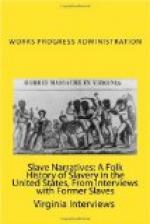Whereas the white teachers did not bother with the Negroes except in the classroom, other white men came who showed a decided interest in them. They were called “carpetbaggers” because of the type of traveling bag which they usually carried, and this term later became synonymous with “political adventurer.” These men sought to advance their political schemes by getting the Negroes to vote for certain men who would be favorable to them. They bought the Negro votes or put a Negro in some unimportant office to obtain the goodwill of the ex-slaves. They used the ignorant colored minister to further their plans, and he was their willing tool. The Negro’s unwise use of his ballot plunged the South further and further into debt and as a result the South was compelled to restrict his privileges.
REFERENCE
1. Personal interview with Douglas Parish, Monticello, Florida
FEDERAL WRITERS’ PROJECT American Guide, (Negro Writers’ Unit)
Viola B. Muse, Field Worker
Palatka, Florida
November 9, 1936
GEORGE PRETTY
George Pretty of Vero Beach and Gifford, Florida, was born a free man, at Altoona, Pennsylvania, January 30, 1852. His father Isaac Pretty was also free born. His maternal grand-father Alec McCoy and his paternal grand-father George Pretty were born slaves who lived in the southern part of Pennsylvania.
He does not know how his father came to be born free but knows that he was told that from early childhood.
In Altoona, according to George, there were no slaves during his life there but in southern Pennsylvania slavery existed for a time. His grand-parents moved from southern Pennsylvania during slavery but whether they bought their freedom or ran away from their masters was never known to George.
As in most of the southland, the customs of the Negro in Altoona abounded in superstition and ignorance. They had about the same beliefs and looked upon life with about the same degree of intelligence as Negroes in the south.
The north being much colder than the south naturally had long ago used coal for fuel. Open grates were used for cooking just as open fireplaces were used in the south. Iron skillets or spiders as they called them, were used for cooking many foods, meats, vegetables, pies puddings and even cakes were baked over the fire.
The old familiar, often referred to as southern ash cake, was cooked on the hearth under the grate, right in Altoona, Pennsylvania. The north because of its rapid advance in the use of modern ways of cooking and doing many other things has been thought by many people to have escaped the crude methods of cooking, but not so. George told how a piece of thick paper was placed on the hearth under the grate and corn dough put upon it to bake. Hot ashes were raked over it and it was left to cook and brown. When it had remained a long enough time, the ashes were shaken off, the cake brushed clean with a cloth and no grit was encountered when it was eaten.




